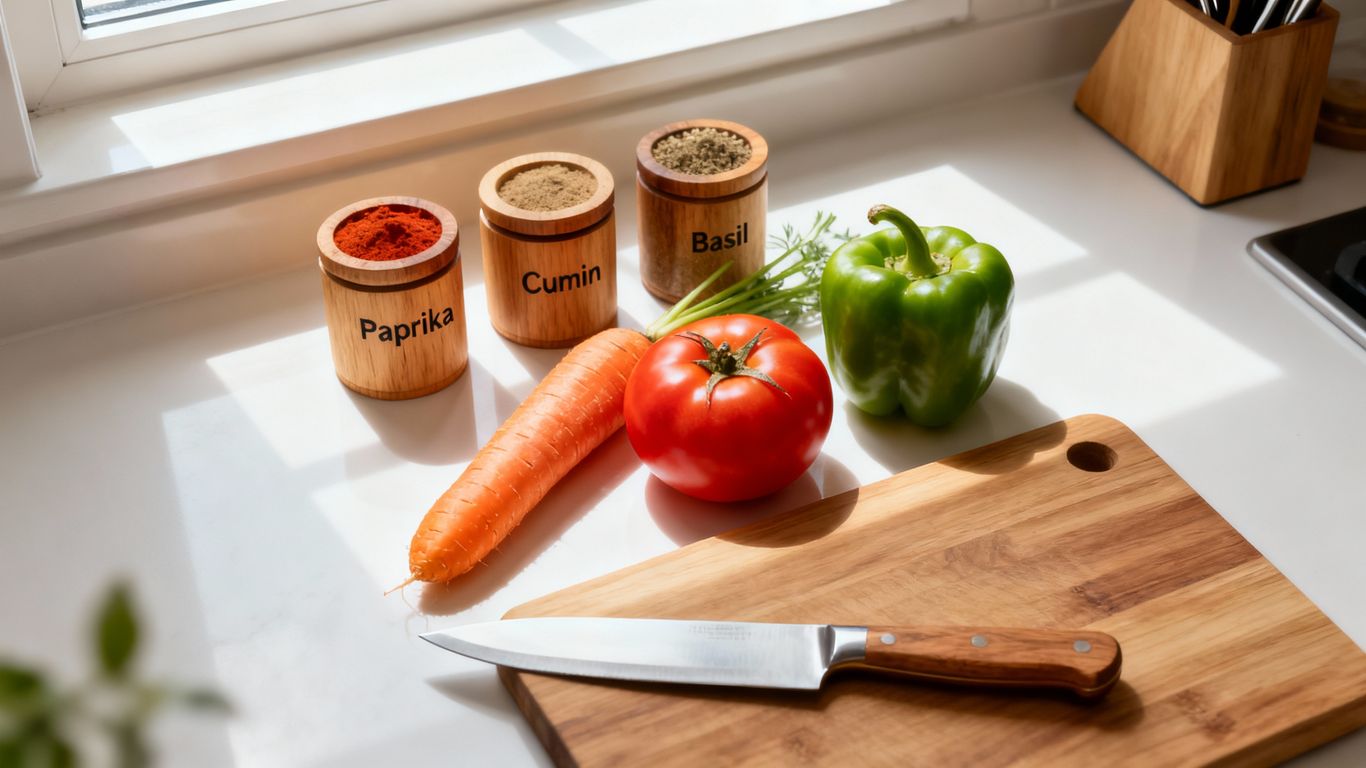Your Guide to How to Start a Food Business at Home in the UK

Thinking about turning your home kitchen into a thriving food business in the UK? It’s a brilliant idea, especially if you love cooking and want to share your tasty creations with the world. Loads of people start businesses from their homes these days, and it’s totally doable. You don’t need a fancy shop or a restaurant to begin. This guide will walk you through the basics of how to start a food business at home, covering what you need to know to get going legally and safely.
Key Takeaways
- Before you start selling any food from home, you absolutely must register your business with your local council. You need to do this at least 28 days before you plan to start trading. It’s free, and they’ll want to check your kitchen is up to scratch for food safety.
- Getting the right food hygiene training is a must. Most people need at least a Level 2 Food Hygiene Certificate to show you know how to handle food safely. Also, keep a close eye on allergen information – you have to tell customers what’s in your food.
- Keeping your kitchen spotless and your food stored correctly are non-negotiable. You’ll need a plan for how you’ll manage food safety, including how you’ll deal with waste and keep everything clean and tidy.
Getting Started With Your Home Food Business
So, you’ve got a passion for cooking and a dream of turning your kitchen into a thriving business? That’s brilliant! Starting a food business from home in the UK can be incredibly rewarding, letting you share your culinary creations with the world. It might seem a bit daunting at first, but with a bit of planning, you’ll be well on your way.
Understanding Your Niche And Menu
First things first, what makes your food special? Are you a whiz with vegan bakes, a master of traditional pies, or perhaps you’ve got a unique family recipe that everyone raves about? Pinpointing your niche is key to standing out. Think about what you love to cook and what people want to buy. It could be anything from gourmet cupcakes to hearty stews, or even specialised dietary options like gluten-free or dairy-free treats.
When you’re figuring out your menu, keep it focused, especially at the start. A smaller, well-executed menu is often better than a huge one with dishes that aren’t quite perfect. Consider:
- Your Signature Dishes: What are you known for? What can you make consistently well?
- Ingredient Sourcing: Can you get good quality ingredients reliably and affordably?
- Profitability: Have you worked out the cost of each dish and how much you need to charge to make a profit?
- Scalability: Can you make enough of your popular items if demand suddenly spikes?
Creating A Solid Business Plan
Now, let’s talk about the nitty-gritty: your business plan. Don’t let the term scare you; it’s basically a roadmap for your business. It helps you think through all the important bits and makes sure you’re heading in the right direction. A good plan will cover:
- Your Business Idea: What are you selling and to whom?
- Market Research: Who are your competitors? What are customers looking for?
- Marketing Strategy: How will people find out about your amazing food? Think about social media, local markets, or even partnering with local shops.
- Financial Projections: How much money do you need to start? How much do you expect to earn?
- Operational Plan: How will you actually make and deliver the food?
Having this written down is super helpful. It forces you to consider all angles and can even help you secure funding if you need it. It’s also a great way to prioritise your next steps and keep yourself on track. For mobile catering, think about the type of setup you’ll need. Will a small trailer suffice, or do you need something larger? Equipment like LPG fryers and griddles are common for mobile setups, so research what fits your menu and budget.
Navigating The Legal Landscape

Right then, let’s get down to the nitty-gritty of making sure your home food business is on the right side of the law. It might sound a bit dry, but getting this sorted from the start means you can focus on cooking up a storm without any worries.
Registering Your Food Business With The Council
First things first, you need to tell your local council you’re setting up shop. This is a free process and it’s really important. You should do this at least 28 days before you plan to start selling food. The council needs to know where your business is based, so if you’re operating from home, it’s the council for your home address. If you’re using a mobile setup like a food trailer, it’s usually where you store it overnight.
- Visit the Food Standards Agency (FSA) website to find out more and get started.
- This registration allows them to schedule an inspection to give you a food hygiene rating.
- Think of it as a friendly check-up to make sure you’re good to go.
Essential Food Hygiene Training And Certification
Knowing your way around food safety is non-negotiable. You and anyone helping you in the kitchen need to have a good grasp of hygiene. It’s not just about keeping things clean; it’s about understanding how to prevent foodborne illnesses.
- Most food businesses require at least one person to have a Food Hygiene Certificate. For a home-based business, it’s wise for you to have at least a Level 2 certificate, and ideally, someone with a Level 3 if you have staff.
- There are loads of online courses available, often with multiple-choice tests. Look for ones that suit your budget and learning style.
- Having these certificates shows customers and inspectors that you take food safety seriously.
Understanding Allergen Regulations
This is a big one, and it’s super important for customer safety. If your food contains any of the 14 major allergens (like peanuts, milk, gluten, etc.), you must tell your customers. This information needs to be clear and easy to find.
- You are legally required to provide information about the allergens present in your food. This could be on your menu, a separate notice, or even verbally if a customer asks directly.
- Don’t guess! If you’re unsure, it’s best to state that the food may contain allergens.
- Having a clear system for tracking allergens in your ingredients and final products is key. Many businesses use a dedicated allergen matrix or chart.
Ensuring Food Safety And Quality
Right then, let’s talk about keeping your food safe and top-notch. This is super important, not just for ticking boxes with the council, but because your customers trust you with their bellies! Making sure your home kitchen is a safe place to cook is the first step.
Maintaining Impeccable Kitchen Hygiene
Your kitchen needs to be spotless. Think about it – if your workspace isn’t clean, how can the food be? This isn’t just about wiping down surfaces after you’ve finished; it’s a daily, even hourly, commitment.
- Regular Cleaning Schedules: Have a plan for cleaning everything, from your worktops and chopping boards to your utensils and equipment. Don’t forget the fridge and oven too!
- Hand Washing: This is non-negotiable. You need a proper hand-washing station with hot and cold running water, soap, and paper towels. Alcohol gels are okay as a backup, but they don’t replace a good scrub.
- Pest Control: Keep your kitchen sealed up tight to stop any unwanted visitors. Crumbs and spills are like an open invitation.
- Equipment Checks: Make sure your cooking equipment, like your fryers or griddles, is clean and in good working order. For example, a clean fryer basket means better tasting food and less chance of old bits burning onto new batches.
Proper Food Storage And Waste Management
How you store your ingredients and get rid of your waste makes a big difference to food safety.
- Storage:
- Keep raw and cooked foods separate to avoid cross-contamination. Use different chopping boards and utensils, or wash them thoroughly between uses.
- Store food at the correct temperatures. Your fridge should be at 5°C or below, and your freezer at -18°C or below. Use a fridge thermometer to check.
- Label and date everything you store, especially leftovers or prepped ingredients. This helps you keep track of what’s what and when it needs to be used.
- Waste Management:
- Dispose of food waste promptly and securely. Use bins with tight-fitting lids.
- Make sure your waste disposal methods comply with local council rules. You don’t want pests attracted to your home.
Developing a Food Safety Management System
This sounds a bit formal, but it’s basically your own set of rules for keeping food safe. It’s often called a HACCP (Hazard Analysis and Critical Control Points) plan. Having this system in place is your best defence if anything goes wrong.
- Identify Hazards: Think about all the things that could go wrong with your food – like bacteria growing, allergens being mixed in, or physical objects getting into the food.
- Control Points: Decide how you’re going to stop these hazards. This might involve cooking food to a certain temperature, chilling it quickly, or making sure you’re clear about allergens.
- Record Keeping: You’ll need to keep records of what you do.
This could include:
- Cleaning schedules and checks.
- Temperature logs for your fridge and freezer.
- Supplier details (where you get your ingredients from).
- Allergen information for your dishes.
- Training records for yourself and any staff.
Taking the time to get these safety measures right will not only keep your customers safe but also give you peace of mind as you grow your business. Keeping your food safe and top-notch is super important. We make sure everything we offer meets the highest standards, so you can trust the quality. Want to know more about how we guarantee great food? Visit our website today!
Ready to Get Cooking?
So, there you have it! Starting a food business from your own kitchen in the UK might seem like a lot, but honestly, it’s totally doable. We’ve covered the main bits, from getting your paperwork sorted with the council and making sure your kitchen is up to scratch, to thinking about what tasty treats you’ll actually sell. Remember, it’s not just about making great food, but also about being smart with the rules and letting people know you exist. Take it one step at a time, keep things clean, and don’t be afraid to ask for help if you need it. Your delicious creations could soon be bringing smiles to plenty of faces!

